Grandly conceived and splendidly realised, Das Rheingold sees Melbourne Opera scale new heights of grandeur.
Taking on a project that is generally seen as a mighty challenge for any opera company in the world, Melbourne Opera begins their eagerly anticipated cycle with a potent mix of vision, skill and sheer bravado. The thrill of attendance is enhanced by the fact that the season sees the long-awaited return of live opera to Melbourne.
Das Rheingold sits handsomely in Melbourne’s mighty Regent Theatre, the venue looking all the more pristine for its 2019 refurbishment. The gleaming venue adds to the sense of occasion, and its operatic acoustics are excellent.
Melbourne has enjoyed a significant renaissance of Wagner’s works in recent years, with his major operas presented by all three major companies. Melbourne Opera’s Ring Cycle benefits from this recent Wagner focus, both in terms of artist experience and audience engagement. Das Rheingold is more than capably performed by an excellent cast of local singers, playing to capacious and ever grateful audiences.
Maestro Anthony Negus makes a welcome return to Melbourne to helm a massive 80-member contingent of the Melbourne Opera Orchestra, which rises to the auspicious occasion with what is arguably their finest performance to date. Booming brass bass notes sound particularly thrilling, accompanied by resounding timpani. The impactful entrance of giants Fasolt and Fafner is just one highlight in an evening of wonderful music.
The work of director Suzanne Chaundy is elevated by the faultless degree of integration she achieves between direction and design. Each aspect of the visually striking staging works together to create a marvellously cohesive whole.
Andrew Bailey’s set design sits proudly on the large Regent stage. The centrepiece is a full-size cantilevered floor, which sweeps grandly into place at the beginning of scene two, creating an early coup de théâtre moment. Just as cleverly, the floor angles up again to conjur the Nibelung subterrain of scene three.
The spectacle of the scenic design and construction is significantly enhanced by the inspired lighting design of Rob Sowinski. Sowinski creates a sense of movement and journey through the lighting, complementing the atmospheric music in a visual sense. The Nibelung underworld teems with chaotic motion and ominous red shadows, and the climactic rainbow bridge effect bathes the stage in glorious colour.
Sowinski’s work brings similar support to Harriet Oxley’s costume designs, particularly the sparkle of the goddesses. Oxley supports the storytelling with vivid costumes that very clearly delineate gods, dwarves, giants and Rhinemaidens.
The design is completed by judiciously sparing use of video projections by Tobias Edwards. Alberich’s smoky transformation to a serpent and then a toad is a terrific sequence, and earth goddess Erda’s brief eleventh-hour visit is heightened by a giant cracked clay facial image.
Chaundy balances the design effects across the 150-minute running time, ensuring that the storytelling is complemented and never overwhelmed. The singers are as important an aspect of the attractive stage pictures as any design element. Most importantly, the drama of the story telling is well scaffolded by Chaundy’s strong character work with the artists.
A highlight of the integration of design and direction comes in the opening scene. The Rhinemaidens come gradually into view, three singers seated in glowing ring-shaped bubbles while two acrobatic performers (Emily Ryan, Lily Paskas Goodfellow) exotically writhe and spin overhead, their movements enhanced by the billowing costumes and gentle lighting. Rebecca Rashleigh (Woglinde), Louise Keast (Wellgunde) and Karen Van Spall (Flosshilde) sing their roles with requisite sweetness. The five artists playing Rhinemaidens show themselves good sports by “grubbying up” to take part in the Nibelungen gold mining scene.
Standouts amongst the well-matched ensemble cast are baritone Simon Meadows and tenor James Egglestone. Meadows makes odious villain Alberich a compelling figure, singing the role with superbly controlled power and gloriously rich tone. Egglestone raises the stage energy from his first entrance, playing fire god Loge as something of an impishly cheeky magician. Egglestone’s tenor voice rings out with crisp clarity and highly appealing tone.
Eddie Muliaumaseali’i gives Wotan, ruler of the Gods a sombre, reflective presence, his bass voice in fine form, if occasionally overwhelmed by the orchestra. As Wotan’s wife Fricka, mezzo-soprano Sarah Sweeting colours her lovely vocals with a plaintive longing, as befitting a woman fearing for the life of her sister.
Was ever a role more suited to soprano Lee Abrahmsen than that of a guileless golden goddess? Abrahmsen blesses the all too brief role of Freia with a reliably charming vocal performance. Tenor Jason Wasley makes the most of the supporting role of Froh, gentle brother of Freia. Rising bass-baritone Darcy Carroll makes a strong impression as Donner, god of thunder, more than holding his own alongside more experienced cast members.
As brutal giants Fasolt and Fafner, Adrian Tamburini and Steven Gallop enjoy what could be described as chemistry; not romantic chemistry, or course, but a strong sense of brotherly connection, with all the bickering and tussling that this can entail. Tamburini engages the audience with an unusually bright tone for a bass voice. Gallop crafts a more ominous characterisation, colouring his singing with a malevolent tone.
Tenor Michael Lapina makes Mime, oppressed brother of Alberich, an adorable urchin, adding to the memorable impression with the attractive quality of his singing. Highly experienced mezzo-soprano Roxane Hislop brings authority and grace to Erda, drawing the eye with her elegant performance despite the massive facial projection looming overhead.
All involved at Melbourne Opera should be enormously proud of the very high standard of Das Rheingold. The sterling quality of the work bodes extremely well for the coming entries in their Ring Cycle. The full cycle in 2023 is highly anticipated.
Das Rheingold plays selected dates at Regent Theatre, Melbourne until 7 February 2021. For tickets, click here.
Das Rheingold plays at Ulumbarra Theatre, Bendigo on 21 February 2021. For tickets, click here.
Das Rheingold will be live streamed via the Melbourne Digital Concert Hall on Sunday 7 February 2021.
Man in Chair reviewed Opera Australia: Das Rheingold.
Man in Chair reviewed Met Opera: Das Rheingold.
Read the Marriner Group’s COVID-safe Information.
Photos: Robin Halls

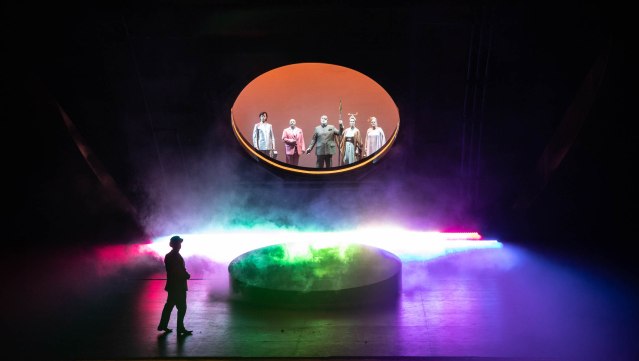
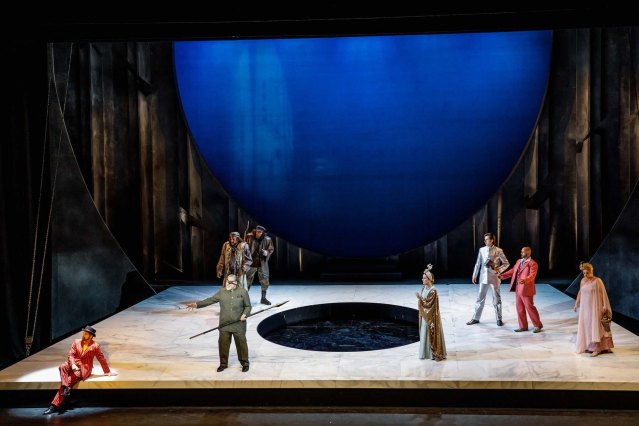


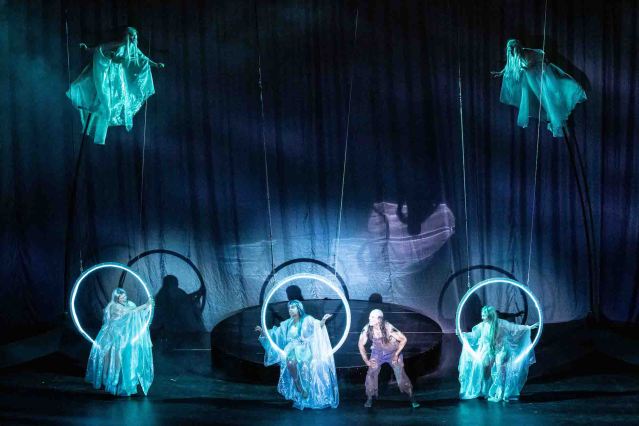
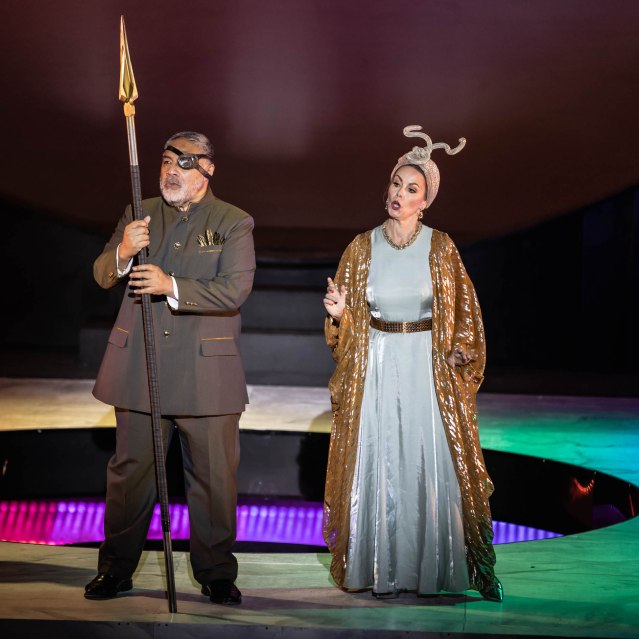
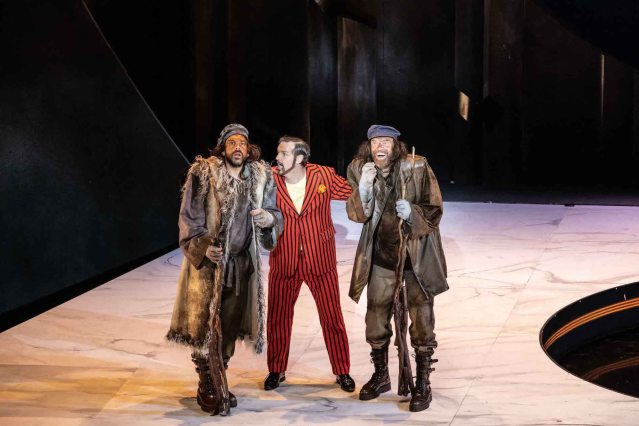
The translation screens were on each side wall but half to the back so u had to take yr eyes off the stage to read them
A most annoying thing to what was a wonderful performance and fantastic stage design
Thanks for sharing this feedback, Rohan. I was in the dress circle, which, fortunately, had a clear view of the overhead surtitles. I guess when a theatre is not usually used for opera, the company has to do the best they can to adapt. Maybe the full cycle in 2023 will end up in the State Theatre, which has much better sightlines for surtitles.
The translation screen was right in the middle of the proscenium on Friday evening which helped with a wonderful night of music and theatre, thank you Melbourne Opera.